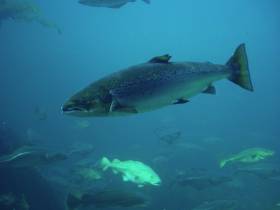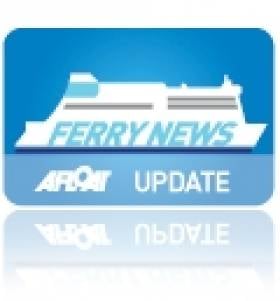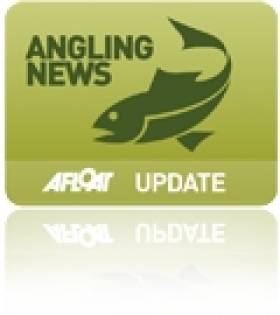Displaying items by tag: court
Mayo Man Convicted Over Unlawfully Caught Salmon
#Angling - A Mayo man was charged with possession of eight unlawfully caught salmon at Lacken Pier on 22 July 2015 at a sitting of Ballina District Court earlier this month.
Stephen Rooney of Ballina, Co Mayo pleaded guilty to the charge and was fined €160 with costs amounting to €250.
Judge John Lindsay heard evidence that fishery officers had observed a car on Lacken Pier on the night of 21st July 2015. The officers noticed liquid oozing from the underside of the car, which they suspected to be blood and mucous from fish.
The car was kept under observation overnight, and in the morning several attempts were made to contact Rooney, its owner. The car was searched when he failed to respond, and eight fresh net-marked salmon and an undersized lobster were found in the boot.
Commenting on the case, Inland Fisheries Ireland (IFI) chief executive Dr Ciaran Byrne said: “Netting of salmon in the open sea has been illegal since 2007 as it is indiscriminate and takes fish destined for different river systems, some of which have depleted salmon stocks and are under severe pressure.
“Salmon angling is extremely valuable to the tourism industry in North Mayo and provides revenue, employment to local communities, and recreation to thousands of anglers both local and visiting from abroad and other parts of Ireland. Inland Fisheries Ireland will continue to work to protect this resource for the good of the community.”
Elsewhere, at sitting of Galway District Court on 7 June, Judge John King convicted two Galway fishermen of the non-payment of fines issued by fishery officers, and ordered a third man to pay a donation on the same charge.
Leslie Sammon, with an address at Ballinasloe, Co Galway, was before the court over non-payment of a fixed penalty notice of €150 for failing to complete a logbook upon taking a salmon from the Clare River, Claregalway last July. He was ordered to pay €200 to the RNLI by Judge King, who agreed to a donation in lieu of a conviction.
Alekseys Minkevics, with an address at Knocknacarra, Co Galway, was also summonsed in connection with an incident on the Clare River on 30 September last.
Minkevics, who failed to appear in court, had been observed fishing with live perch, in breach of fisheries legislation, and failed to pay the fine within the required timeframe.
Judge King convicted Minkevics and ordered him to pay €300, as well as €600 in costs. His fishing equipment was also ordered to be forfeited.
Viktor Buss, with an address at Headford Road, Galway was charged with a breach of a coarse fish byelaw on 5 October when he was found in possession of 32 coarse fish, eight times the legal limit. He was issued with a fixed penalty notice of €150 which he failed to pay.
Judge King recorded a conviction against Buss, who did not appear in court, and issued a fine of €300 with costs amounting to €600. His fishing equipment was also forfeited.
IFI has a confidential hotline number to enable members of the general public to report incidents - 1890 34 74 24 or 1890 FISH 24. This phone line is designed to encourage the reporting of incidents of illegal fishing, water pollution and invasive species.
#FERRY NEWS - The captain of the cargo ship Union Moon, who was arrested after his vessel collided with a passenger ferry in Belfast Lough, has been charged with 'excess alcohol by the master of a ship'.
BBC News reports that the 55-year-old was set to appear in court today, following his arrest yesterday.
No one was injured in the incident on Wednesday, when the Union Moon collided with the Stena Feronia close to the Fairway buoy between Carrickfergus and Helen's Bay. Both vessels were substantially damaged.
The cargo ship, which was carrying 2,000 tonnes of aggregate, was brought back to Belfast. Philip McNamara of the Donaghdee lifeboat confirmed that a large section of her bow was missing.
Meanwhile, engineers from Stena Irish Sea are assessing the damage to their vessel to determine how long it will be out of service. The Stena Feronia sails the route from Belfast to Birkenhead in Merseyside.
The Maritime and Coastguard Agency, the Marine Accident Investigation Branch and the PSNI are all involved in the investigation.
BBC News has more on the story HERE.
- Ferry news
- collision
- Belfast Lough
- cargo ship
- Union Moon
- captain
- charged
- drink
- excess alcohol
- ferry
- Stena Feronia
- Birkenhead
- Merseyside
- court
- Fairway buoy
- Carrickfergus
- Helen's Bay
- Philip McNamara
- Donaghdee
- Lifeboat
- Stena Irish Sea
- Maritime and Coastguard Agency
- Marine Accident Investigation Branch
- psni
Man Escapes Jail for Illegal Fishing, Obstructing Officer
#ANGLING - A man narrowly escaped prison for obstructing a fisheries officer in a case taken by Inland Fisheries Ireland (IFI) at Carrickmacross District Court earlier this month.
Piotr Flaga - of Bog Road in Drogheda - was fined €450 by Judge Sean McBride after he was found to have set lines at a lake in Carrickmacross on 18 and 19 August last with the intention of taking coarse fish illegally.
The court heard that when apprehended by Assistant Inspector Ronan O’Brien, Flaga refused to co-operate and would not give his name and address. He then obstructed Asst Insp O’Brien by moving his vehicle towards him in a bid to escape when questioned.
Gardai were called to the scene and subsequently Flaga was issued with two summons.
Flaga entered a guilty plea and was convicted under Sections 301 and 308 of the 1959 Fisheries Act. He was further charged for breach of byelaw 595 of 1977 in relation to fishing in fresh water for coarse fish by means other than rod and line.
The defendant was fined a total of €450 with five months to pay with 14 days imprisonment in default. Some €500 in costs were also awarded to Inland Fisheries Ireland.
Judge MacBride acknowledged Flaga's public apology to Asst Insp O'Brien, but emphasised that any person who came before him in future for a similar offence would face imprisonment.


























































